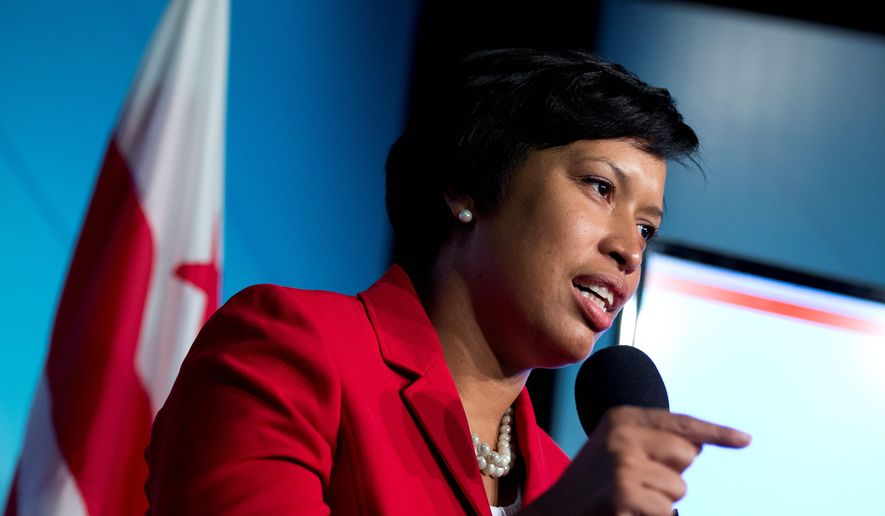Jobs, affordable housing, and attacking homelessness were her guiding priorities in constructing her first budget proposal, D.C. Mayor Muriel Bowser told a Washington audience Wednesday, a budget that also includes tax increases and cuts to higher education.
Chief Financial Officer Jeff DeWitt “told me, after looking through the city’s expenses that I had to find a way to fill a $190 million budget gap,” Ms. Bowser told a luncheon audience at the Economic Club of Washington, D.C. “Not only was I able to close that gap, but I was able to make the important investments to make the city economy more prosperous.”
Ms. Bowser’s first budget proposal will, the mayor said, balance the budget while meeting her spending priorities by raising the sales tax from 5.75 percent to 6 percent, equal to the sales tax in Maryland and Virginia, and increasing the tax on parking lots and garages by 4 percent. The budget also includes cuts to the University of the District of Columbia and Medicaid reimbursements to hospitals.
The new taxes would only effect District of Columbia residents.
She went on to tell the crowd that jobs, housing and reducing the homeless population are inextricably linked in her vision for the city’s future.
“You can’t afford housing if you don’t have a good paying job,” she added. “We are a tech capital, so we need to foster that because it is important to keep businesses inside the District of Columbia.”
SEE ALSO: Marion Barry’s widow sues husband’s kidney donor
The mayor said that her budget proposal would also help fund and build large homeless centers around the District of Columbia to house the city’s nearly 8,000 homeless people.
Ms. Bowser laid out some ways her administration hopes to attract businesses and jobs to Washington D.C. She said that without thriving small businesses dotting the District of Columbia landscape, jobs will be lost and the economic standing of the city will be hurt.
She highlighted “tax increment financing” (TIF) programs and tax abatements — which is a method many city governments use to subsidize current improvements — as tools that the “private sector and the public sector could use” to stimulate business development.
Tax abatements have been criticized in the past by free-market think tanks as tax giveaways to well-connected businesses, but the mayor was unapologetic in her support for them.
“I am frequently asked if I believe in having things like TIFs and tax abatements as business incentive tools, and I always say yes, because we want to have every tool on the table when we are competing in this region,” Ms. Bowser said.
But when asked after the event for details about her openness toward using more TIF programs, tax abatements, and other city financing schemes, Ms. Bowser told reporters that she was “not familiar with them.”
SEE ALSO: Maryland family of 8 died after utility cut off stolen electric meter
She qualified her comments later, saying that “we have ongoing discussions about them, looking at them project by project,” she added.
Ultimately, she said, “I think we have to have all economic development tools on the table to help bring and keep businesses in the city.”




Please read our comment policy before commenting.